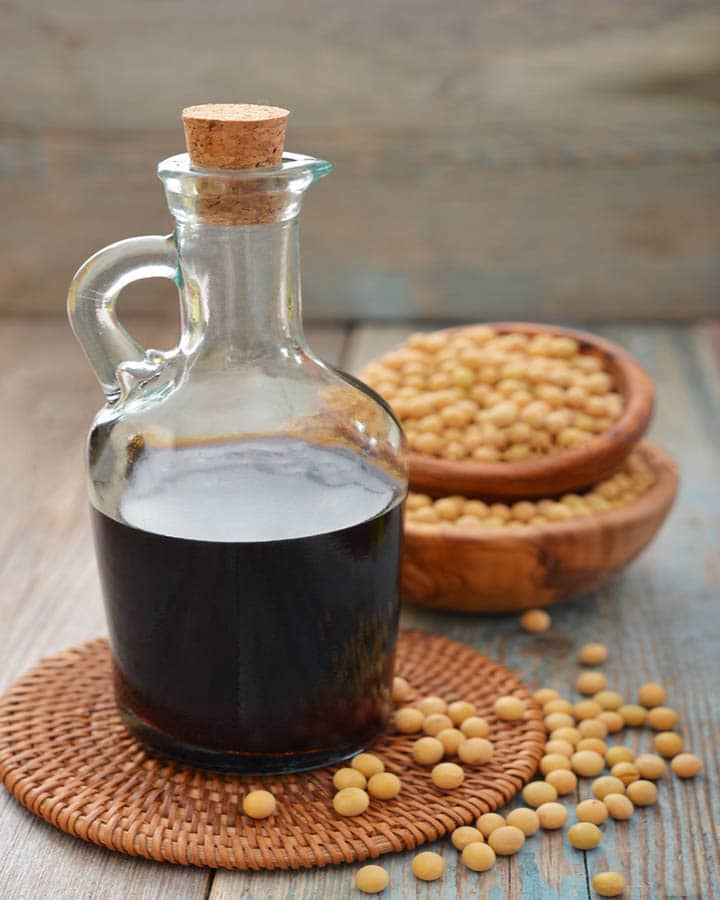Do you want to know about Soy Sauce Nutrition? Soy sauce is a sauce that contains 8.70 grams of protein, 6.70 grams of carbohydrates, 2.90 grams of sugar per 100 grams and is fat-free, providing 65.70 calories to the diet. Its nutrients also include vitamins B3, B9, B4, and B6. In addition to these properties, soy sauce contains potassium.
This page collects information on the nutritional characteristics and other properties of soy sauce as a summary. Here you can find information about the proteins, vitamins, and minerals in soy sauce as well as other nutrients such as fiber, calories or cholesterol.
The proportions of the nutrients in soy sauce can vary depending on the type and quantity of the sauce. As well as other factors that may intervene in the modification of its nutrients. Remember that depending on the preparation of soy sauce, its nutritional properties and characteristics may vary.
You can use this information to know the contribution to your diet of this or other foods. This information can help you eat better by preparing healthy and nutritious recipes with soy sauce. However, the information on this and other foods has been obtained from various sources and may not be completely accurate.
So you should consult your doctor or a nutritionist. Before starting any regimen or making drastic changes to your diet. On this page, you can also see the characteristics of soy sauce with other foods.
Soy sauce benefits
Among the foods in the category of sauces and condiments that we have available among the foods in our usual store or supermarket, is soy sauce.
Below you can see information about the nutritional characteristics, properties, and benefits that soy sauce brings to your body, as well as the amount of each of its main nutrients.
Soy sauce is a food rich in sodium since 100 g. of this sauce contain 5720 mg. of sodium. It enhances and improves the flavor of meals, providing more than 300 aromatic nuances without masking the original flavors.
Thanks to it, you can limit (and even completely eliminate) the use of salt as a condiment. Provides, protein to the body. It helps digest food thanks to its elaboration based on fermented food.
Among the nutritional properties of soy sauce, it should be noted that 100 grams of soy sauce has the following nutrients:
[su_note note_color=”#cef5e3″]2.70 mg. of iron| 8.70 g. protein| 19 mg. of calcium| 1.60 g. fiber| 360 mg. of potassium| 0 mg. iodine| 0.20 mg. zinc| 6.70 g. of carbohydrates| 43 mg. magnesium| 0 ug. vitamin A| 0.05 mg. of vitamin B1| 0.13 mg. of vitamin B2| 4.80 mg. of vitamin B3| 0.32 ug. of vitamin B5| 0.20 mg. of vitamin B6| 0 ug. of vitamin B7| 11 ug. of vitamin B9| 0 ug. of vitamin B12| 0 mg. vitamin C| 0 ug. vitamin D| 0 mg. vitamin E| 0 ug. Vitamin K| 210 mg. phosphorous| 65.70 kcal. of calories| 0 mg. of cholesterol| 0.10 g. of fat| 2.90 g. of sugar| 0 mg. of purines.[/su_note]
soy sauce side effects
Eating foods that contain soy or soy protein products is safe. Soy can cause some minor side effects like constipation, bloating, and nausea. It can also cause allergic reactions with itchy rashes in some people.
Children
It is safe when used in amounts commonly found in food or infant formula. The use of soy formula does not appear to cause reproductive or health problems later in life. Safe when used as an alternative to cow’s milk in children who are allergic
Breast cancer
The effects of soy in people with breast cancer are unclear. Some research finds that it may support certain breast cancers because it can act as, estrogen. The difference in effects could have something to do with the amount taken.
Renal insufficiency
Soy contains a chemical called phytoestrogen. Very high levels of phytoestrogens can be toxic. People with kidney failure who use soy sauce may be at risk for blood levels of phytoestrogens to become too high.
Kidney stones
There is some concern that they may increase the risk of kidney stones because they contain large amounts of oxalates. If you have a history of kidney stones, avoid taking large amounts of soy.
Bladder cancer
The products may increase the chances of getting bladder cancer. Avoid food if you have bladder cancer or a high risk of getting it.
Nutritional Information Tables for Soy Sauce
Below is a table summarizing the main nutrients in soy sauce as well as a list of links to tables showing details of its nutritional properties for soy sauce. They include its main nutrients as well as the proportion of each one.
Nutrition Table
| Calories | 65.70kcal |
| Grease | 0.10 g |
| Cholesterol | 0 mg |
| Sodium | 5720 mg |
| Carbohydrates | 6.70 g |
| Fiber | 1.60 g |
| Sugars | 2.90 g |
| Protein | 8.70 g |
The amount of the nutrients shown in the tables above corresponds to 100 grams of this sauce

